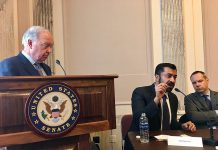The big Haitian population in Florida makes the presidents remarks a problem for the GOP heading into the 2018 mid-terms.
In 2016 the state of Florida voted for Donald Trump over Hillary Clinton in a very close election and one of the few minority voting groups that supported him was the states large Haitian community. In a 2016 campaign stop in Miami’s “Little Haiti,” community it was candidate Trump that promised to be a “Champion for the Haitian people.” It was that visit that helped to gain Trump his narrow win in Florida.
President Trump’s vulgar comments disparaging Haiti, El Salvador and African countries reverberated across the country Friday – but Florida was ground zero for those remarks and it sent the state GOP into damage control.
Trump’s description of “shithole countries” in an Oval Office meeting with lawmakers Thursday forced Florida Gov. Rick Scott, a longtime close ally of the president into a defensive move as he denounced the president’s words.
Gov. Scott has designs of running for the United States Senate and he can ill afford to offend any group of voters. Republican lawmakers issued strongly-worded statements condemning what the leader of their party said. And GOP strategists and activists worried about the fallout in a battleground that is home to one of the country’s largest populations of Latin Americans.
It didn’t take long for residents of the Sunshine State to react to the words from the Oval Office.
Florida is the third largest state in the country trailing only California and Texas. It should surprise no one that the largest Haitian population in the United States is in Florida with around 450,000 calling the Sunshine State home.
The states very diverse make up also includes a large number of people who have legally come to Florida from African countries, so naturally the state was ground zero for a quick reaction to the remarks coming from the president.
Republican congresswoman Ileana Ros-Lehtinen of Florida, who says Trump has a long history of making racist statements. (Jan. 12)
Farah Larrieux is a Haitian immigrant in Miami who represents a national alliance of people like her who have been granted protections against deportation after natural disasters in their nations.
“This is beyond politics. The guy has no respect for anyone. I am trying not to cry,” Larrieux said. “I can’t understand how someone goes from making a statement in Little Haiti saying ‘I want to be the biggest champion of Haiti’ to calling Haiti a ‘shithole.’ It makes me sick.” She referred to a 2016 campaign stop in Miami’s Haitian neighborhood.
“This is beyond bullying,” Larrieux said. “This is a racial campaign against immigrants.”
Djenane Gourgue, of the Haitian-American Chamber of Commerce of Florida, says she is not letting Trump’s remarks affect her anymore, adding “his actions can probably hurt more.”
“We spend too much time commenting or watching or being pissed off at what Mr. Trump says. That’s what he does well … ,” Haitian-born Gourgue said. “Those words cannot affect me. … He’s just being a bully.”
An offended group of the Florida Haitian community is a potential problem for the Republicans in Florida. There is already another big voting block upset with President Trump.
After Hurricane Maria hit Puerto Rico in September, Trump told local officials they should feel “very proud” they hadn’t lost hundreds of lives like in “a real catastrophe” like Hurricane Katrina. Later, he gave the federal response “a 10,” even as the island territory was struggling to recover.
In 2016, Florida’s nearly 1.1 million Puerto Ricans was second only to New York as the largest population of island transplants. By one estimate after last year’s storm, at least 100,000 Puerto Ricans were expected to relocate to Florida, at least on a temporary basis.
There is a long time between January and November’s elections but there is no question the Republicans are hoping to find a way to repair their relationships with minorities. But the Democrats need to make a case why they deserve the votes to push their agenda, so this battle will continue throughout the year heading into November.
The quotes used in this story came from Associated Press.















